- Home
- Raymond Chandler
The High Window pm-3 Page 3
The High Window pm-3 Read online
Page 3
“Yeah,” I said. “Supposing it made any difference to me.”
“You are hired to find my wife, I gather.”
I made a snorting sound and grinned at him over the pipe bowl.
“Marlowe,” he said, even more earnestly, “I’ll try hard, but I don’t think I am going to like you.”
“I’m screaming,” I said. “With rage and pain.”
“And if you will pardon a homely phrase, your tough guy act stinks.”
“Coming from you, that’s bitter.”
He leaned back again and brooded at me with pale eyes. He fussed around in the chair, trying to get comfortable. A lot of people had tried to get comfortable in that chair. I ought to try it myself sometime. Maybe it was losing business for me.
“Why should my mother want Linda found?” he asked slowly. “She hated her guts. I mean my mother hated Linda’s guts. Linda was quite decent to my mother. What do you think of her?”
“Your mother?”
“Of course. You haven’t met Linda, have you?”
“That secretary of your mother’s has her job hanging by a frayed thread. She talks out of turn.”
He shook his head sharply. “Mother won’t know. Anyhow, Mother couldn’t do without Merle. She has to have somebody to bully. She might yell at her or even slap her face, but she couldn’t do without her. What did you think of her?”
“Kind of cute—in an old world sort of way.”
He frowned. “I mean Mother. Merle’s just a simple little girl, I know.”
“Your powers of observation startle me,” I said.
He looked surprised. He almost forgot to fingernail the ash of his cigarette. But not quite. He was careful not to get any of it in the ashtray, however.
“About my mother,” he said patiently.
“A grand old warhorse,” I said. “A heart of gold, and the gold buried good and deep.”
“But why does she want Linda found? I can’t understand it. Spending money on it too. My mother hates to spend money. She thinks money is part of her skin. Why does she want Linda found?”
“Search me,” I said. “Who said she did?”
“Why, you implied so. And Merle—”
“Merle’s just romantic. She made it up. Hell, she blows her nose in a man’s handkerchief. Probably one of yours.”
He blushed. “That’s silly. Look, Marlowe. Please, be reasonable and give me an idea what it’s all about. I haven’t much money, I’m afraid, but would a couple of hundred—”
“I ought to bop you,” I said. “Besides I’m not supposed to talk to you. Orders.”
“Why, for heaven’s sake?”
“Don’t ask me things I don’t know. I can’t tell you the answers. And don’t ask me things I do know, because I won’t tell you the answers. Where have you been all your life? If a man in my line of work is handed a job, does he go around answering questions about it to anyone that gets curious?”
“There must be a lot of electricity in the air,” he said nastily, “for a man in your line of work to turn down two hundred dollars.”
There was nothing in that for me either. I picked his broad mahogany match out of the tray and looked at it. It had thin yellow edges and there was white printing on it. ROSEMONT H. RICHARDS ‘3—the rest was burnt off. I doubled the match and squeezed the halves together and tossed it in the waste basket.
“I love my wife,” he said suddenly and showed me the hard white edges of his teeth. “A corny touch, but it’s true.”
“The Lombardos are still doing all right.”
He kept his lips pulled back from his teeth and talked through them at me. “She doesn’t love me. I know of no particular reason why she should. Things have been strained between us. She was used to a fast moving sort of life. With us, well, it has been pretty dull. We haven’t quarreled. Linda’s the cool type. But she hasn’t really had a lot of fun being married to me.”
“You’re just too modest,” I said.
His eyes glinted, but he kept his smooth manner pretty well in place.
“Not good, Marlowe. Not even fresh. Look, you have the air of a decent sort of guy. I know my mother is not putting out two hundred and fifty bucks just to be breezy. Maybe it’s not Linda. Maybe it’s something else. Maybe—” he stopped and then said this very slowly, watching my eyes, “maybe it’s Morny.”
“Maybe it is,” I said cheerfully.
He picked his gloves up and slapped the desk with them and put them down again. “I’m in a spot there all right,” he said. “But I didn’t think she knew about it. Morny must have called her up. He promised not to.”
This was easy. I said: “How much are you into him for?” It wasn’t so easy. He got suspicious again. “If he called her up, he would have told her. And she would have told you,” he said thinly.
“Maybe it isn’t Morny,” I said, beginning to want a drink very badly. “Maybe the cook is with child by the iceman. But if it was Morny, how much?”
“Twelve thousand,” he said, looking down and flushing.
“Threats?”
He nodded.
“Tell him to go fly a kite,” I said. “What kind of lad is he? Tough?”
He looked up again, his face being brave. “I suppose he is. I suppose they all are. He used to be a screen heavy. Good looking in a flashy way, a chaser. But don’t get any ideas. Linda just worked there, like the waiters and the band. And if you are looking for her, you’ll have a hard time finding her.”
I sneered at him politely.
“Why would I have a hard time finding her? She’s not buried in the back yard, I hope.”
He stood up with a flash of anger in his pale eyes. Standing there leaning over the desk a little he whipped his right hand up in a neat enough gesture and brought out a small automatic, about .25 caliber with a walnut grip. It looked like the brother of the one I had seen in the drawer of Merle’s desk. The muzzle looked vicious enough pointing at me. I didn’t move.
“If anybody tries to push Linda around, he’ll have to push me around first,” he said tightly.
“That oughtn’t to be too hard. Better get more gun—unless you’re just thinking of bees.”
He put the little gun back in his inside pocket. He gave me a straight hard look and picked his gloves up and started for the door.
“It’s a waste of time talking to you,” he said. “All you do is crack wise.”
I said: “Wait a minute,” and got up and went around the desk. “It might be a good idea for you not to mention this interview to your mother, if only for the little girl’s sake.”
He nodded. “For the amount of information I got, it doesn’t seem worth mentioning.”
“That straight goods about your owing Morny twelve grand?”
He looked down, then up, then down again. He said: “Anybody who could get into Alex Morny for twelve grand would have to be a lot smarter than I am.”
I was quite close to him. I said: “As a matter of fact I don’t even think you are worried about your wife. I think you know where she is. She didn’t run away from you at all. She just ran away from your mother.”
He lifted his eyes and drew one glove on. He didn’t say anything.
“Perhaps she’ll get a job,” I said. “And make enough money to support you.”
He looked down at the floor again, turned his body to the right a little and the gloved fist made a tight unrelaxed arc through the air upwards. I moved my jaw out of the way and caught his wrist and pushed it slowly back against his chest, leaning on it. He slid a foot back on the floor and began to breathe hard. It was a slender wrist. My fingers went around it and met.
We stood there looking into each other’s eyes. He was breathing like a drunk, his mouth open and his lips pulled back. Small round spots of bright red flamed on his cheeks. He tried to jerk his wrist away, but I put so much weight on him that he had to take another short step back to brace himself. Our faces were now only inches apart.
“How com
e your old man didn’t leave you some money?” I sneered. “Or did you blow it all?”
He spoke between his teeth, stiff trying to jerk loose. “If it’s any of your rotten business and you mean Jasper Murdock, he wasn’t my father. He didn’t like me and he didn’t leave me a cent. My father was a man named Horace Bright who lost his money in the crash and jumped out of his office window.”
“You milk easy,” I said, “but you give pretty thin milk. I’m sorry for what I said about your wife supporting you. I just wanted to get your goat.”
I dropped his wrist and stepped back. He still breathed hard and heavily. His eyes on mine were very angry, but he kept his voice down.
“Well, you got it. If you’re satisfied, I’ll be on my way.”
“I was doing you a favor,” I said. “A gun toter oughtn’t to insult so easily. Better ditch it.”
“That’s my business,” he said. “I’m sorry I took a swing at you. It probably wouldn’t have hurt much, if it had connected.”
“That’s all right.”
He opened the door and went on out. His steps died along the corridor. Another screwball. I tapped my teeth with a knuckle in time to the sound of his steps as long as I could hear them. Then I went back to the desk, looked at my pad, and lifted the phone.
4
After the bell had rung three times at the other end of the line a light childish sort of girl’s voice filtered itself through a hank of gum and said: “Good morning. Mr. Morningstar’s office.”
“Is the old gentleman in?”
“Who is calling, please?”
“Marlowe.”
“Does he know you, Mr. Marlowe?”
“Ask him if he wants to buy any early American gold coins.”
“Just a minute, please.”
There was a pause suitable to an elderly party in an inner office having his attention called to the fact that somebody on the telephone wanted to talk to him. Then the phone clicked and a man spoke. He had a dry voice. You might even call it parched.
“This is Mr. Morningstar.”
“I’m told you called Mrs. Murdock in Pasadena, Mr. Morningstar. About a certain coin.”
“About a certain coin,” he repeated. “Indeed. Well?”
“My understanding is that you wished to buy the coin in question from the Murdock collection.”
“Indeed? And who are you, sir?”
“Philip Marlowe. A private detective. I’m working for Mrs. Murdock.”
“Indeed,” he said for the third time. He cleared his throat carefully. “And what did you wish to talk to me about, Mr. Marlowe?”
“About this coin.”
“But I was informed it was not for sale.”
“I still want to talk to you about it. In person.”
“Do you mean she has changed her mind about selling?”
“No.”
“Then I’m afraid I don’t understand what you want, Mr. Marlowe. What have we to talk about?” He sounded sly now.
I took the ace out of my sleeve and played it with a languid grace. “The point is, Mr. Morningstar, that at the time you called up you already knew the coin wasn’t for sale.”
“Interesting,” he said slowly. “How?”
“You’re in the business, you couldn’t help knowing. It’s a matter of public record that the Murdock collection cannot be sold during Mrs. Murdock’s lifetime.”
“Ah,” he said. “Ah.” There was a silence. Then, “At three o’clock,” he said, not sharp, but quick. “I shall be glad to see you here in my office. You probably know where it is. Will that suit you?”
“I’ll be there,” I said.
I hung up and lit my pipe again and sat there looking at the wall. My face was stiff with thought, or with something that made my face stiff. I took Linda Murdock’s photo out of my pocket, stared at it for a while, decided that the face was pretty commonplace after all, locked the photo away in my desk. I picked Murdock’s second match out of my ashtray and looked it over. The lettering on this one read: TOP ROW W. D. WRIGHT ‘36.
I dropped it back in the tray, wondering what made this important. Maybe it was a clue.
I got Mrs. Murdock’s check out of my wallet, endorsed it, made out a deposit slip and a check for cash, got my bank book out of the desk, and folded the lot under a rubber band and put them in my pocket.
Lois Magic was not listed in the phone book.
I got the classified section up on the desk and made a list of the half dozen theatrical agencies that showed in the largest type and called them. They all had bright cheerful voices and wanted to ask a lot of questions, but they either didn’t know or didn’t care to tell me anything about a Miss Lois Magic, said to be an entertainer.
I threw the list in the wastebasket and called Kenny Haste, a crime reporter on the Chronicle.
“What do you know about Alex Morny?” I asked him when we were through cracking wise at each other.
“Runs a plushy nightclub and gambling joint in Idle Valley, about two miles off the highway back towards the hills. Used to be in pictures. Lousy actor. Seems to have plenty of protection. I never heard of him shooting anybody on the public square at high noon. Or at any other time for that matter. But I wouldn’t like to bet on it.”
“Dangerous?”
“I’d say he might be, if necessary. All those boys have been to picture shows and know how nightclub bosses are supposed to act. He has a bodyguard who is quite a character. His name’s Eddie Prue, he’s about six feet five inches tall and thin as an honest alibi. He has a frozen eye, the result of a war wound.”
“Is Morny dangerous to women?”
“Don’t be Victorian, old top. Women don’t call it danger.”
“Do you know a girl named Lois Magic, said to be an entertainer. A tall gaudy blond, I hear.”
“No. Sounds as though I might like to.”
“Don’t be cute. Do you know anybody named Vannier? None of these people are in the phone book.”
“Nope. But I could ask Gertie Arbogast, if you want to call back. He knows all the nightclub aristocrats. And heels.”
“Thanks, Kenny. I’ll do that. Half an hour?”
He said that would be fine, and we hung up. I locked the office and left.
At the end of the corridor, in the angle of the wall, a youngish blond man in a brown suit and a cocoa-colored straw hat with a brown and yellow tropical print band was reading the evening paper with his back to the wall. As I passed him he yawned and tucked the paper under his arm and straightened up.
He got into the elevator with me. He could hardly keep his eyes open he was so tired. I went out on the street and walked a block to the bank to deposit my check and draw out a little folding money for expenses. From there I went to the Tigertail Lounge and sat in a shallow booth and drank a martini and ate a sandwich. The man in the brown suit posted himself at the end of the bar and drank coca colas and looked bored and piled pennies in front of him, carefully smoothing the edges. He had his dark glasses on again. That made him invisible.
I dragged my sandwich out as long as I could and then strolled back to the telephone booth at the inner end of the bar. The man in the brown suit turned his head quickly and then covered the motion by lifting his glass. I dialed the Chronicle office again.
“Okay,” Kenny Haste said. “Gertie Arbogast says Morny married your gaudy blond not very long ago. Lois Magic. He doesn’t know Vannier. He says Morny bought a place out beyond Bel-Air, a white house on Stillwood Crescent Drive, about five blocks north of Sunset. Gertie says Morny took it over from a busted flush named Arthur Blake Popham who got caught in a mail fraud rap. Popham’s initials are still on the gates. And probably on the toilet paper, Gertie says. He was that kind of a guy. That’s all we seem to know.”
“Nobody could ask more. Many thanks, Kenny.”
I hung up, stepped out of the booth, met the dark glasses above the brown suit under the cocoa straw hat and watched them turn quickly away.
&n
bsp; I spun around and went back through a swing door into the kitchen and through that to the alley and along the alley a quarter block to the back of the parking lot where I had put my car.
No sand-colored coupe succeeded in getting behind me as I drove off, in the general direction of Bel-Air.
5
Stillwood Crescent Drive curved leisurely north from Sunset Boulevard, well beyond the Bel-Air Country Club golf course. The road was lined with walled and fenced estates. Some had high walls, some had low walls, some had ornamental iron fences, some were a bit old-fashioned and got along with tall hedges. The street had no sidewalk. Nobody walked in that neighborhood, not even the mailman.
The afternoon was hot, but not hot like Pasadena. There was a drowsy smell of flowers and sun, a swishing of lawn sprinklers gentle behind hedges and walls, the clear ratchety sound of lawn mowers moving delicately over serene and confident lawns.
I drove up the hill slowly, looking for monograms on gates. Arthur Blake Popham was the name. ABP would be the initials. I found them almost at the top, gilt on a black shield, the gates folded back on a black composition driveway.
It was a glaring white house that had the air of being brand new, but the landscaping was well advanced. It was modest enough for the neighborhood, not more than fourteen rooms and probably only one swimming pool. Its wall was low, made of brick with the concrete all oozed out between and set that way and painted over white. On top of the wall a low iron railing painted black. The name A. P. Morny was stenciled on the large silver-colored mailbox at the service entrance.
I parked my crate on the street and walked up the black driveway to a side door of glittering white paint shot with patches of color from the stained glass canopy over it. I hammered on a large brass knocker. Back along the side of the house a chauffeur was washing off a Cadillac.
The door opened and a hard-eyed Filipino in a white coat curled his lip at me. I gave him a card.
“Mrs. Morny,” I said.
He shut the door. Time passed, as it always does when I go calling. The swish of water on the Cadillac had a cool sound. The chauffeur was a little runt in breeches and leggings and a sweat-stained shirt. He looked like an overgrown jockey and he made the same kind of hissing noise as he worked on the car that a groom makes rubbing down a horse.

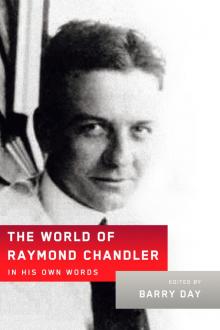 The World of Raymond Chandler: In His Own Words
The World of Raymond Chandler: In His Own Words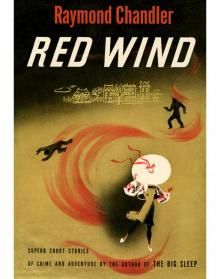 Red Wind: A Collection of Short Stories
Red Wind: A Collection of Short Stories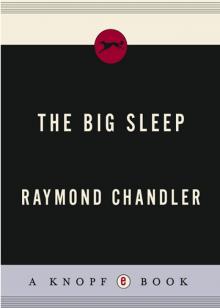 The Big Sleep
The Big Sleep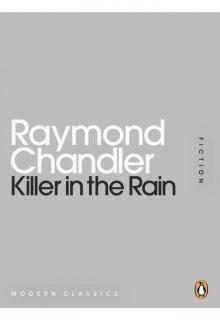 Killer in the Rain
Killer in the Rain Playback
Playback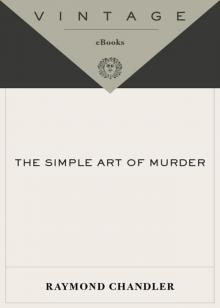 The Simple Art of Murder
The Simple Art of Murder The Bronze Door
The Bronze Door The Little Sister
The Little Sister The Lady in the Lake
The Lady in the Lake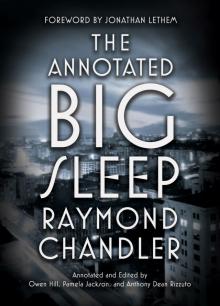 The Annotated Big Sleep
The Annotated Big Sleep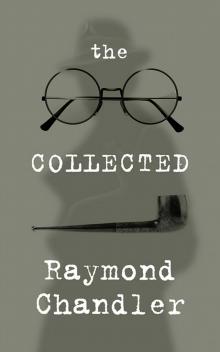 The Collected Raymond Chandler
The Collected Raymond Chandler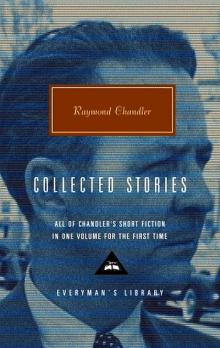 Collected Stories (Everyman's Library)
Collected Stories (Everyman's Library)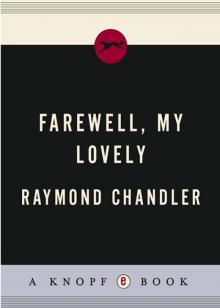 Farewell, My Lovely
Farewell, My Lovely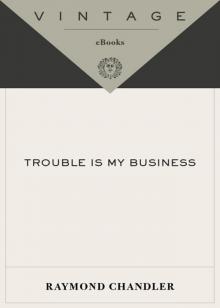 Trouble Is My Business
Trouble Is My Business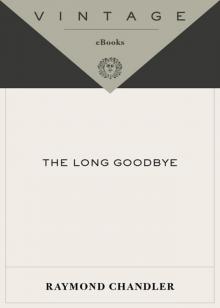 The Long Goodbye
The Long Goodbye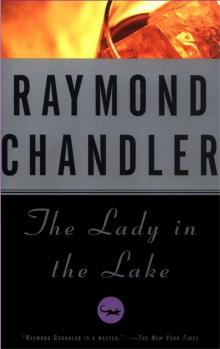 The Lady in the Lake pm-4
The Lady in the Lake pm-4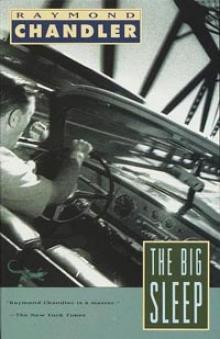 The Big Sleep pm-1
The Big Sleep pm-1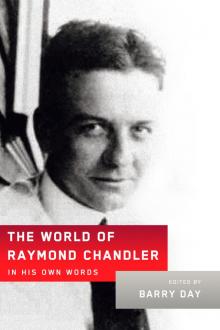 The World of Raymond Chandler
The World of Raymond Chandler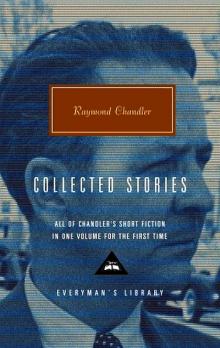 Collected Stories of Raymond Chandler
Collected Stories of Raymond Chandler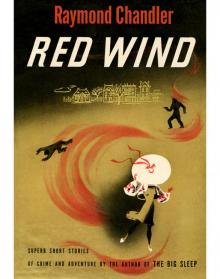 Red Wind
Red Wind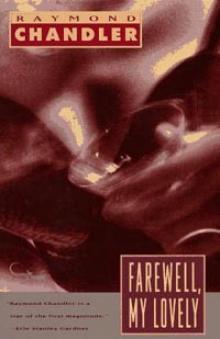 Farewell, My Lovely pm-2
Farewell, My Lovely pm-2 The Raymond Chandler Papers: Selected Letters and Nonfiction, 1909–1959
The Raymond Chandler Papers: Selected Letters and Nonfiction, 1909–1959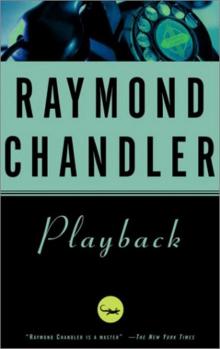 Playback pm-7
Playback pm-7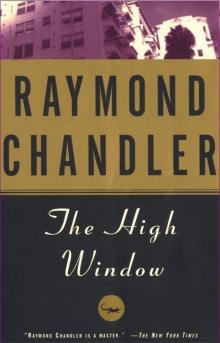 The High Window pm-3
The High Window pm-3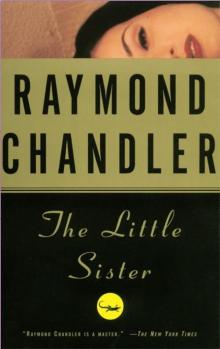 The Little Sister pm-5
The Little Sister pm-5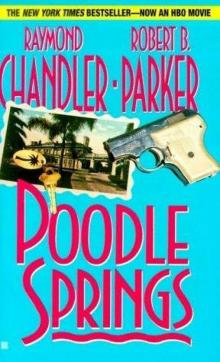 Poodle Springs (philip marlowe)
Poodle Springs (philip marlowe)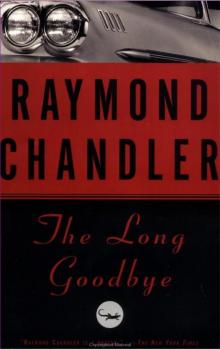 The Long Goodbye pm-6
The Long Goodbye pm-6